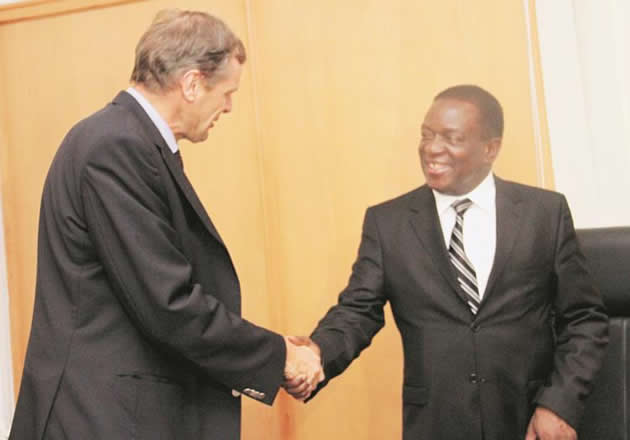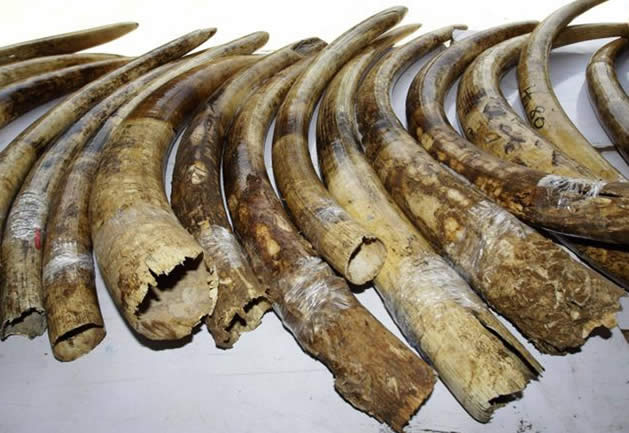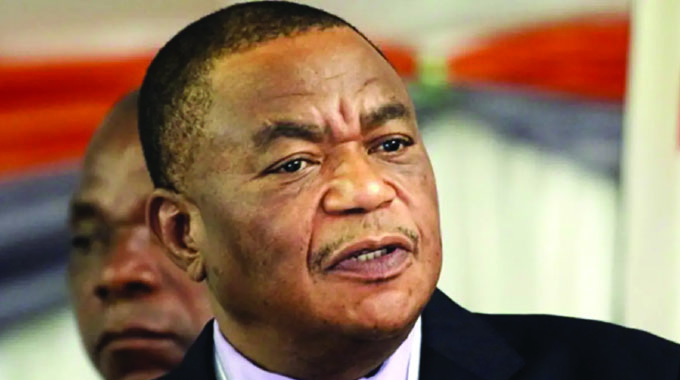Govt mobilises food


Acting President Emmerson Mnangagwa welcomes Mr Phillipe van Damme, Ambassador – Head of delegation of the European Union to Zimbabwe, at his Munhumutapa offices in Harare yesterday
Lloyd Gumbo Senior Reporter
Government is mobilising food to mitigate the effects of drought using its own resources, but is open to assistance from international organisations which may want to complement the efforts.
This came out during a courtesy call made by European Union ambassador Mr Philippe Van Damme on Acting President Emmerson Mnangagwa at his Munhumutapa offices yesterday.
Mr Van Damme requested the meeting in which he explained the bloc’s preparedness to assist, not only Zimbabwe, but other countries in the region that have been ravaged by drought.
Play the video below
Sources who attended the meeting said Acting President Mnangagwa told Mr Van Damme that Zimbabwe was already mobilising food to mitigate the effects of the drought.
“Remember the ambassador is the one who requested the meeting, so he was giving an indication of their state of preparedness to assist once the exact food requirements have been verified,” said the source.
Also read:
“Acting President Emmerson Mnangagwa told him that Government had already put fillers in place to mobilise food to mitigate the drought. He said they are welcome to assist, but Government was not sitting on its laurels.”
Speaking to journalists after the meeting, Mr Van Damme said Government should urgently quantify the food assistance needed so that international organisations may chip in.
He said after quantifying the food requirements, it was important for Government to declare a food crisis emergency so that international organisations can mobilise resources and immediately assist.
Mr Van Damme said since it was a new year, it was important to take stock of the overall bilateral relations between Zimbabwe and EU member States.
“In that context, of course, we have raised the issue of drought and spoke about how external partners of Zimbabwe could assist the Government in coping with the challenges of the upcoming drought,” he said.
“One of the issues that we discussed in that regard is that there is a lot of international competition for humanitarian aid, so it’s extremely important that the Government moves very swiftly and quantify as much as possible the extent of the challenges.
“And on that basis they possibly consider making a declaration of humanitarian emergency because as you know some of the countries have already made the declaration. That draws the attention of the partners on the country and facilitates the mobilisation of resources.”
Mr Van Damme said it would be premature to speak about how much the EU bloc would raise for humanitarian assistance since the food requirements were yet to be quantified.
He said the EU was glad that the Office of the President and Cabinet informed all stakeholders where the country stood.
“We will try to find out how we can help the Government accelerate that process and come to decision-making point, including the private sector because they have to play a critical role in mobilising food supplies for the country,” said Mr Van Damme.
Zimbabwe is importing about 700 000 tonnes to avert hunger in most parts of the country following last year’s drought.
It is expected that Government will import more maize as the current farming season is unlikely to yield a lot due to drought, as most parts of the world, including Zimbabwe, are experiencing the worst El Nino in 18 years.
The country requires about 1,8 million tonnes of grain for human and livestock consumption per year. The nation produced about 800 000 tonnes of maize last season due to poor rains and floods in some areas.
Over 60 grain importers have been licensed by the responsible authorities to import 1,2 million tonnes of maize and to date they have brought in 450 000 tonnes.
Mr Van Damme said he also discussed the debt clearance strategy that Zimbabwe proposed and was approved by international creditors in Lima, Peru in October last year.
He said the EU bloc was ready to assist Zimbabwe in preparing the reform agenda that the country was expected to present in Washington soon.










Comments